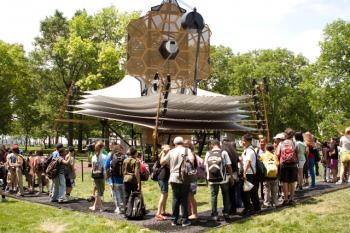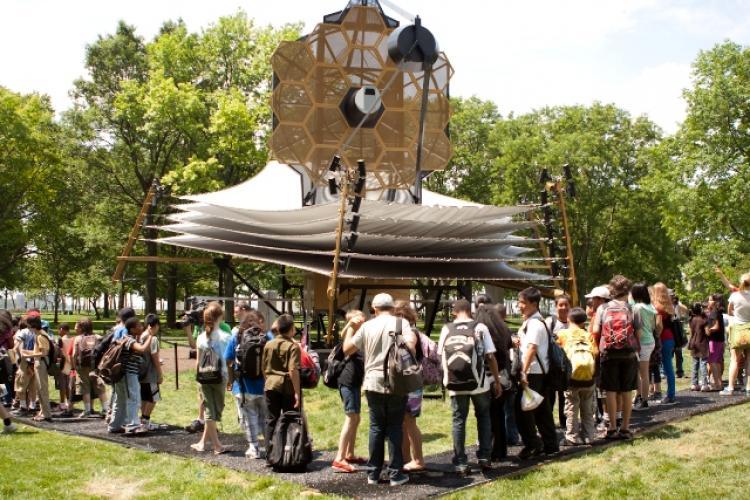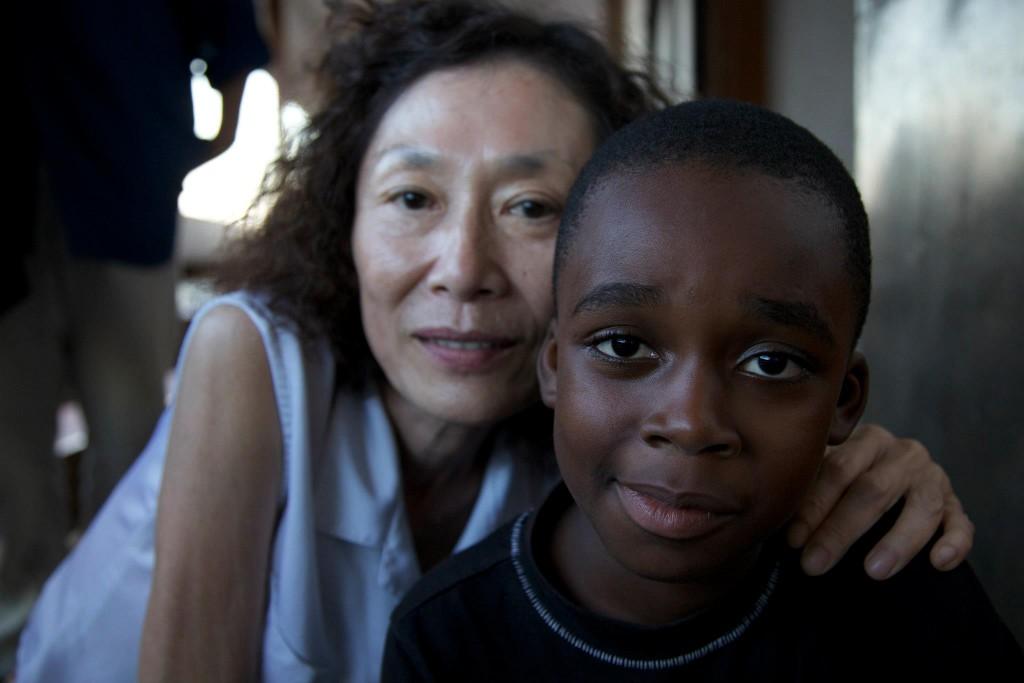NEW YORK—At the third annual World Science Festival, NASA representatives on Tuesday launched the week-long celebration of science by announcing the project for the James Webb space telescope, which will be held in Battery Park throughout the week.
“I expect the knowledge gained from Webb to expand the frontiers of science and rewrite science textbooks for the next generation,” said Lori Garver, NASA deputy administrator in front of press and about a hundred middle-school children who were on a field trip.
The James Webb telescope will be completed in 2014. It will be the first to be named after a NASA administrator, not an astronaut, and it is already referred to as Hubble’s successor. “Hubble is running out of vision,” stated Dr. John Grunsfeld, deputy director for the Space Telescope Science Institute at the press conference. Dr. Jon A. Morse said that the Webb telescope is 10 to 100 times more sensitive than the Hubble.
The tennis court-sized model, which began as just a sketch on paper 15 years ago, is on display in the middle of Battery Park and shows what the telescope will look in its unfolded position out in space, after it travels 1 million miles from Earth. First the telescope will be folded and attached to a rocket, then it will be launched into space and, once released, it will unravel its five sun shielding layers that help keep the telescope cool and absorb infrared light that will help detect objects at great distances.
“From cradle to grave, it will cost over $5 billion,” said the director of the Astrophysics Division at NASA. The telescope itself is designed and constructed by Northrop Grumman, a provider of aircrafts, electronics, missile systems, and other technologies for government and commercial customers. “What we find, we hope it will be a surprise,” said Dr. John C. Mather, Nobel Prize for Physics laureate.
The World Science Festival promises plenty of other surprises throughout the week including interactive exhibits, experiments, games, shows, panel talks by leading scientists, and a free stargazing event that invites everyone for an evening of getting closer to the stars.
Brian Green, cofounder of the World Science Festival invited all the school kids to take advantage of the stargazing evening and to bring their own telescopes, or use the ones that will be set up. Experienced astronomers and amateurs will be present at the event, on June 4 at Battery Park, and will guide and talk about our cosmos, stars and the universe.
“I’m so impressed with kids today, some of them are just so smart, they know so much, they’re the ones that will extend out to the future” said Mather. The James Webb space telescope aims to present a new outlook for the next generation, will provide insights into our past and may provide answers to questions scientists have been asking for decades.
More information available at: www.worldsciencefestival.com.
“I expect the knowledge gained from Webb to expand the frontiers of science and rewrite science textbooks for the next generation,” said Lori Garver, NASA deputy administrator in front of press and about a hundred middle-school children who were on a field trip.
The James Webb telescope will be completed in 2014. It will be the first to be named after a NASA administrator, not an astronaut, and it is already referred to as Hubble’s successor. “Hubble is running out of vision,” stated Dr. John Grunsfeld, deputy director for the Space Telescope Science Institute at the press conference. Dr. Jon A. Morse said that the Webb telescope is 10 to 100 times more sensitive than the Hubble.
The tennis court-sized model, which began as just a sketch on paper 15 years ago, is on display in the middle of Battery Park and shows what the telescope will look in its unfolded position out in space, after it travels 1 million miles from Earth. First the telescope will be folded and attached to a rocket, then it will be launched into space and, once released, it will unravel its five sun shielding layers that help keep the telescope cool and absorb infrared light that will help detect objects at great distances.
“From cradle to grave, it will cost over $5 billion,” said the director of the Astrophysics Division at NASA. The telescope itself is designed and constructed by Northrop Grumman, a provider of aircrafts, electronics, missile systems, and other technologies for government and commercial customers. “What we find, we hope it will be a surprise,” said Dr. John C. Mather, Nobel Prize for Physics laureate.
The World Science Festival promises plenty of other surprises throughout the week including interactive exhibits, experiments, games, shows, panel talks by leading scientists, and a free stargazing event that invites everyone for an evening of getting closer to the stars.
Brian Green, cofounder of the World Science Festival invited all the school kids to take advantage of the stargazing evening and to bring their own telescopes, or use the ones that will be set up. Experienced astronomers and amateurs will be present at the event, on June 4 at Battery Park, and will guide and talk about our cosmos, stars and the universe.
“I’m so impressed with kids today, some of them are just so smart, they know so much, they’re the ones that will extend out to the future” said Mather. The James Webb space telescope aims to present a new outlook for the next generation, will provide insights into our past and may provide answers to questions scientists have been asking for decades.
More information available at: www.worldsciencefestival.com.







